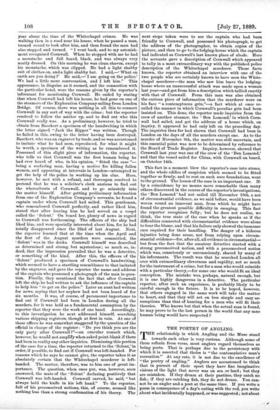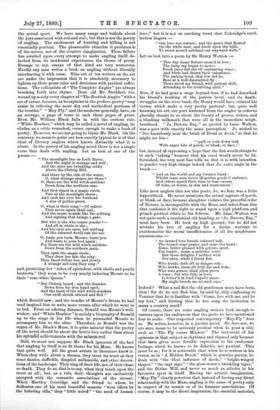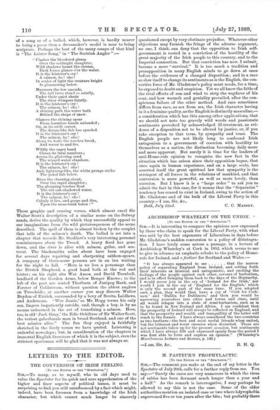THE POETRY OF ANGLING.
relationship in which Angling and the Muse stand
towards each other is very curious. Although some of them refrain from verse, most anglers regard themselves as being poets. That is perhaps due to the persistency with which it is asserted that theirs is "the contemplative man's recreation." At any rate, it is not due to the excellence of "the poetry of angling." Anglers are accustomed to think that in pursuit of their sport they have fine imaginative visions of the light that never was on sea or land; but they are mistaken. If they dream at their pastime, they catch no fish; if they are catching fish, they do not dream. You can- not be an angler and a poet at the same time. If you write a poem in consequence of a day's outing with the rod, you write about what incidentally happened, or was suggested; not about
the actual sport. We have many songs and ballads about the joys associated with rod and reel; but that is not the poetry of angling. The excitement of hunting and killing is not essentially poetical. The pleasurable stimulus it produces is of the nerves, not of the creative imagination. Thus, failure has awaited upon every attempt to make angling itself, de- tached from its incidental experiences, the theme of poesy.
Strange to say, essays of that kind are very numerous. Hardly any man writes a book on angling without liberally interleaving it with verse. Nine out of ten writers on the art are under the impression that it is absolutely necessary to lighten up their prose tales and doctrines with poetical reflec- tions. The colloquists of "The Complete Angler" are always breaking forth into rhyme. Dear old Mr. Stoddart, too, wound up nearly every chapter of "The Scottish Angler" with a set of verses, because, as he explains in the preface, poetry "may assist in relieving the more dry and methodical portions of the treatise." "May-fly," and the moderns generally, have, on an average, a page of verse to each three pages of prose. Even Mr. William Black falls in with the curious rule. " White Heather," which may be called a novel of angling, in- cludes, as a critic remarked, verses enough to make a book of poetry. However, we are not going to blame Mr. Black. On the contrary, we mean to point out how exactly typical he is of that class of literary anglers which knows distinctly what it is about. In the poetry of his angling novel there is not a single verse that deals with angling. Let us look at one of the poems :—
"The moonlight lies on Loch Naver, And the night is strange and still ; And the stars are twinkling coldly Above the Clebrig Hill.
And there by the side of the water, 0, what strange shapes are these ? 0, these are the wild witch-maidens Down from the northern seas.
And they stand in a magic circle, Pale as the moonlight sheen ; And each has over her forehead A star of golden green.
0, what is their song P—Of sailors That never again shall sail; • And the music sounds like the sobbing And sighing that brings a gale.
But who is she who comes yonder P— And all in white is she ;
And her eyes are open, but nothing Of the outward world can she see.
0, haste you back, Afeenie, haste you And haste to your bed again ; For these are the wild witch-maidens Down from the northern main.
They open the magic circle ; They draw her into the ring; They kneel before her, and slowly A strange sad song they sing ?
and, promising her "robes of splendour, with shells and pearls bestrewn," they seem to be very nearly inducing Meenie to be their "rose-white Queen."
"But Clebrig heard; and the thunder Down from his iron hand sped;
And the band of the wild witch-maidens One swift shriek uttered and fled :"
which Ronald saw ; and the wonder of Meenie's dream he had read inspired him to write more verses, after which he went in to bed. From an adoring distance, Ronald was Meenie's well- wisher; and "White Heather "is mainly a biography of Ronald up to the stage in his life when he persuaded lieenie to accompany him to the altar. Therefore, as Ronald was the organ of Mr. Black's Muse, it is quite natural that the poetry of the novel should be about the hero's love rather than about
his splendid achievements with the salmon-rod.
Still, we must not suppose Mr. Black ignorant of the fact that angling by itself is no fit theme for his Muse. He knows
that quite well. All the great artists in literature know it.
When they write about a stream, they treat its trout as they treat daisies, daffodils, dimpled milkmaids, and other decora- tions of the landscape. They sing of their life, not of their chase
or death. They do so, that is to say, when they touch upon the trout at all ; but, as a rule, their thoughts are exclusively occupied with the romantic associations of the stream.
When Hartley Coleridge and the friend to whom he dedicates one of his most beautiful sonnets "were idlers by the loitering rills," they "little noted" "the need of human love ;" but it is not on catching trout that Coleridge's recol- lection lingers :—
"Our love was nature ; and the peace that floated On the white mist, and dwelt upon the hills, To sweet accord subdued our wayward wills."
Let us look into a poem by Sir Henry Wotton :—
"This day dame Nature seem'd in love; The lusty sap began to move;
Fresh juice did stir th' embracing vines ; And birds had drawn their valentines. The jealous trout, that low did lie, Rose at a well-dissembled fly : There stood my friend, with patient skill, Attending to his trembling quill."
Now, if he had gone a stage beyond that, if he had described his friend's hooking of the jealous trout, and its death- struggles on the river-bank, Sir Henry would have vitiated his verses, which make a very pretty pastoral ; but, quite well
knowing his art, our poet hastened from the angler in order to placidly chaunt to us about the beauty of groves, violets, and a blushing milkmaid, that were all in the immediate neigh- bourhood. "Jo. Davers, Esq.," as quoted by Isaac Walton, was a poet with exactly the same perception. Jo. wished to "live harmlessly near the brink of Trent or Avon," so that he
might see his—
"quill or cork down sink With eager bite of perch, or bleak, or dace ;"
but, instead of expressing a hope that the fish would always be in such " taking " humour that his creel would never be ill- furnished, the very next line tells us that it is with intention to ponder very high things indeed that Jo. casts angle in the brook :—
" And on the world and my Creator think : Whilst some men strive ill-gotten goods t' embrace, And others spend their time in base excess Of wine, or worse, in war and wantonness."
Like most anglers that are also poets, Jo., we fear, was a little hypocritical. He never mentions the actual capture of perch, or bleak, or dace, because slaughter violates the peaceful order of Nature, is incompatible with the Muse, and takes from him that confesses it the right to stand upon a high platform and preach poetical ethics to his fellows. Mr. Isaac Walton was not quite such a casuistical old humbug as "Jo. Davers, Esq.," must have been. He took up high ground ; but he did not mistake his love of angling for a divine warrant to anathematise the moral insufficiencies of all his neighbours amusements :—
" An inward love breeds outward talk.
The hound some praise, and some the hawk; Some, better pleased with private sport, Use tennis ; some, a mistress court : But these delights I neither wish Nor envy, while I freely fish.
Who hunts, doth oft in danger ride ; Who hawks, lures oft both far and wide ; Who uses games, shall often prove A loser; but who falls in love, Is fetter'd in fond Cupid's snare :
My angle breeds me no such care."
Indeed ? What a sad flirt the old gentleman must have been, then ! for do we not find him, by-and-by, slily confessing to Venator that he is familiar with "Come, live with me, and be my love," and hinting that he has sung the invitation to many a country maid ?
Of course, there are some angling writers bold enough to venture upon the endeavour that the poets we have mentioned fear to make Our respected contemporary "May-fly "does
so. He writes, however, in a jocular mood. He does not, we are sure, mean to be seriously poetical when he pens a title such as "The Fly versus Minnow." The statement of his opinions on that subject is rhythmic and rhymed only because that f.rm gives more forcible expression to his exuberant
feelings, which he knows to be didactic, not poetical. This must be so ; for it is noticeable that when he is serious in his verses, as in "A Hidden Brook," which is genuine poetry, he deals with "the blest influence of deeds," "bright-winged shapes," "the rapt sage," "the glow-worm's twinkling taper," and the Divine Will, and never so much as alludes to his favourite sport in itself. Having the artistic imagination, "May-Fly "clearly perceives that, instead of having any direct relationship with the Muse, angling is the cause of poetry only in respect of its cosmic or of its humane associations. Of course, it may be the direct inspiration, the essential material, Of a song or of a ballad, which, however, is hardly nearer to being a poem than a dressmaker's model is near to being sculpture. Perhaps the best of the many essays of that kind is "The Leister Song," in "The Scottish Angler "
" Flashes the blood-red gleam
Over the midnight slaughter, Wild shadows haunt the stream, Dark forms glance o'er the water.
It is the leisterer's cry ! A salmon, ho ! oho !
In scales of light the creature bright Is glimmering below.
Murmurs the low cascade, The tall trees stand so saintly, Under their quiet shade The river whispers faintly.
It is the leisterer's cry !
The salmon, ho ! oho !
A shining path the water bath Behind the shape of snow.
Glances the shining spear From harmless hands unheeded ; On, in its swift career, The dream-like fish has speeded.
It is the leisterer's cry !
The salmon, ho ! oho ! • Along its wake the torches break, And waver to and fro.
Wildly the eager band Closes its fatal numbers ; Across its glistering sand The wizard water slumbers.
It is the leisterer's cry !
The salmon, ho ! oho !
And, lightning-like, the white prongs strike The jaded fish below.
Rises the cheering shout, Over the rapid slaughter; The gleaming torches flout The old oak-shadowed water.
It is the leisterer's cry !
The salmon, ho ! oho !
Calmly it lies, and gasps and dies, Upon the moss-bank below !"
Those graphic and rousing verses, which almost excel Sir Walter Scott's description of a similar scene on the Solway
sands, derive the quality by which they successfully appeal to our imaginations from the wild picturesqueness of the scene described. The spell of them is almost broken by the couplet that tells of the salmon's death. The ballad is set into a chapter that records Mr. Stoddart's very interesting personal reminiscences about the Tweed. A heavy flood has gone down, and the river is alive with salmon, grilse, and sea- trout. The blacksmiths miles about have been engaged for several days repairing and sharpening sahlon-spears. A company of three-score persons are in an inn waiting for the night to fall. "Here is no less a personage than the Ettrick Shepherd, a good hand both at the rod and leister ; on his right sits Wat Amos, and David Turnbull, landlord of the Gordon Arms, below Benger Knowe ; to the left of the poet are seated Thorburn of Junipeg Bank, and Forster of Coldstream, without question the ablest anglers on Tweedside ; at another corner you may discern Walter Brydon of Ettrick, surrounded by a bevy of Scotts, Laicllaws, and .Andersons. Wee Jamie,' as Mr. Hogg terms his only son, lingers impatiently outside, and, though a boy, is by no means unlearned in the art of transfixing a salmon. Here, too, is old Jock Gray,' the Edie Ochiltree of Sir Walter Scott, the veriest gaberlunzie man in broad Scotland, and one of the best mimics alive." The fun they enjoyed is faithfully sketched in the lively verses we have quoted. Leistering is unlawful nowadays ; but, in consideration of the chapters in immortal English literature of which it is the subject, even the strictest sportsman will be glad that it was not always so.




































 Previous page
Previous page